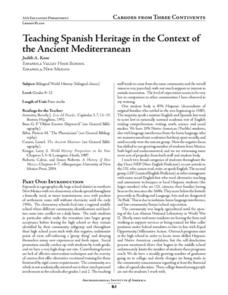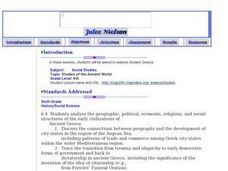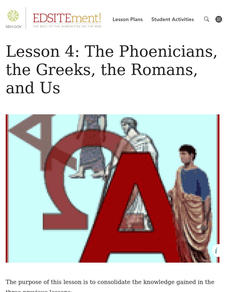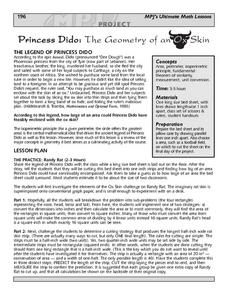Curated OER
Teaching Spanish Heritage in the Context of the Ancient Mediterranean
Students identify and interpret Spanish heritage, including the Mediterranean culture, language, history, trade, and migration. Following, they began an in-depth study of Egypt, the Middle East, Greece, and Rome and were able to make...
Curated OER
Studies of the Ancient World
Sixth graders, after taking a pretest, write a paragraph describing the difference between Athens and Sparta and write an article about the ancient Phoenicians, describing their contributions to world history. They compare democracy in...
Curated OER
The Interconnectedness of Ancient Peoples Map Study
Seventh graders begin this lesson by viewing various maps of the Ancient World. As a class, they take notes on the changes of different areas in Europe and Asia as their teacher lectures to them. They answer questions about the...
Curated OER
Civilizations of the Ancient Near East
Sixth graders investigate ancient civilizations by creating a research project. In this world history instructional activity, 6th graders investigate historic civilizations developed close to important rivers of the near East. Students...
Dade Schools
Ancient Greece
What role does geography play in the development of a culture? How does ancient Greek culture still influence civilization today? These and other questions are explored in a unit study of Ancient Greece. The overview of the unit provided...
National Endowment for the Humanities
Lesson 4: The Phoenicians, the Greeks, the Romans, and Us
Learners review knowledge gained in the three-part unit on the history of the alphabet. Using maps and images, learners consolidate their understanding of ancient Greece, the Romans and the Phoenicians, and their respective impacts on...
Curated OER
The Alphabet is Historic: The Roman Alphabet is our Alphabet
Students show that the Greeks, Phoenicians and Romans lived in the Mediterranean area. They give reasons why the alphabet was important for the Romans. and say that the Romans developed the alphabet they are learning in school.
National Endowment for the Humanities
The Greek Alphabet: More Familiar Than You Think!
In this Greek alphabet lesson, pupils explore the Phoenician origins to the Greek alphabet. Learners compare Greek letters to current letters and write a paragraph about the life of students in ancient Greece. They also identify Greece...
Curated OER
Primary Sources and Archaeology in the Study of Ancient Mediterranean Trade
Tenth graders begin the lesson plan by plotting trade routes, major empires and items traded. Using primary sources, they examine their own values regarding trading items for royality. They participate in a role-play exercise in which...
Curated OER
PEOPLE OF THE FERTILE CRESCENT
Students evaluate how technology changed life in Mesopotamia. Students summarize the link between agriculture and religion in Sumer. Students classify the Sumerians according to social classes. Students classify the causes and effects...
Curated OER
The Alphabet is Historic
Students describe how the Phoenicians, Greeks and Romans passed down the alphabet through the generations. They compare and contrast the letters from early alphabets to the one of today and discuss how they are different. Using a map,...
Curated OER
The Geometry Of An Ox Skin
High schoolers investigate the concepts of area and perimeter. The lesson plan uses a legend to create a context for the proposed word problem. They use the skill of estimation in order to create an ox skin that is found in the story.
Curated OER
Applications of Cargoes from Three Continents to the Latin Classroom
Students discuss the importance of communication and writing in their daily lives. In groups, they use the internet to research the development of letters, alphabets and writing materials. They trace the spread of the Latin language...














